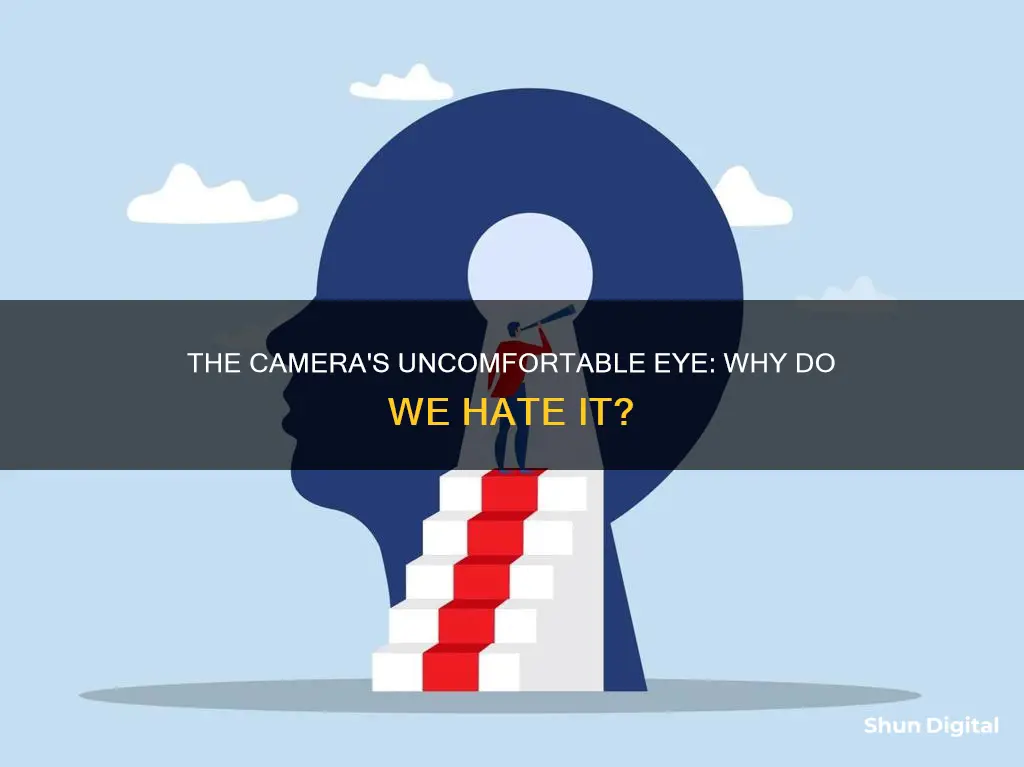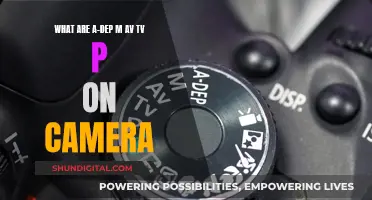
It is completely normal to not like watching yourself on camera. There are several reasons why you might feel this way, and it all comes down to how your brain processes information.
Firstly, the mere-exposure effect or the familiarity principle suggests that we tend to favour things that are familiar to us. When we look in the mirror, we see a reflected version of ourselves, which is not the same as how others see us. So, when we watch ourselves on video, it can be jarring and unfamiliar, leading to discomfort.
Secondly, confirmation bias plays a role. This is our tendency to seek out information that confirms our pre-existing beliefs. If you believe you are awkward on camera, you will focus on any evidence that supports this belief, ignoring any signs that contradict it.
Additionally, our brains use shortcuts called heuristics to process information quickly. However, these shortcuts can lead to cognitive biases that disrupt rational thinking. When watching ourselves on video, these biases can make us overly critical and uncomfortable.
Lastly, the sound of our voice that we hear when speaking is different from what others hear due to the acoustics in our head. This discrepancy can also contribute to the cringe factor when we watch or hear ourselves on video or recording.
Understanding these psychological factors can help us become more comfortable with seeing and hearing ourselves on camera.
| Characteristics | Values |
|---|---|
| Brain function | The brain uses shortcuts to make sense of the world, which can lead to cognitive biases and disrupt rational thinking. |
| Confirmation bias | The tendency to search for and interpret information that confirms our pre-existing beliefs or expectations. |
| Familiarity principle | We are more comfortable with things we are familiar with. We are used to seeing a mirror image of ourselves, so our true image can seem unfamiliar. |
| Self-esteem | Our ability to remember feedback depends on whether it confirms our self-esteem. |
| Sound conduction | The way we hear our own voice is different from how others hear it because our voice resonates within our skull. |
What You'll Learn
- We are more critical of ourselves than others are of us
- Our brains use shortcuts to process information, which can lead to biases and irrational thoughts
- We are more familiar with our mirror image than our true image
- We aren't used to the sound of our real voice
- Confirmation bias makes us focus on negative aspects of ourselves

We are more critical of ourselves than others are of us
It is very common to dislike watching yourself on camera or video. Our brains use shortcuts to process information, and we tend to focus on the negative, which can make us overly self-critical.
Why We Are More Critical of Ourselves Than Others Are of Us
Confirmation Bias
Confirmation bias is our tendency to seek out information that backs up our previously held beliefs. If we think we are awkward on camera, we will look for evidence of that when reviewing the footage. We will ignore how smoothly we presented or how funny we were, and instead focus on any slight hint of clumsiness to confirm our belief that we are a real-life Mr. Bean.
Memory and Feedback
A 1998 study by Amber Story of George Washington University showed that our ability to remember feedback depends on whether that feedback matches our self-esteem. If one person says we are awkward, we will remember that. If ten people say we are great, we will forget about them. Some will only seek feedback from people who will confirm their negative self-perception.
The Familiarity Principle
The familiarity principle states that we prefer people, objects, and products that we are familiar with. This is why we want to appear on camera—to get our customers familiar with us. However, the underlying psychology of the familiarity principle, the mere-exposure effect, does not work for our own faces. We have always seen our faces as a mirror image, which is not our true face. When we see our true face on video, it doesn't look right. We can still recognize it as ourselves, but it is not what we are used to seeing.
How to Be Less Self-Critical
Don't Criticize Your Self-Criticism
Criticizing your self-criticism will likely lead to even more self-criticism and painful emotions like anxiety and shame. It is a misguided belief that we have to do something in response to self-criticism. Instead, we should be aware of our self-criticism and then get on with our lives.
Redirect Self-Criticism to Specific Behaviors
Try transforming self-criticism of your entire self ("I'm such an idiot!") into realistic criticism of specific behaviors ("I did poorly on that presentation because I procrastinated on preparing for it."). Broad criticisms of your worth as a person are neither true nor helpful.
Write Down Your Self-Criticism
Writing down your self-criticism slows down the process and results in fewer critical thoughts and less painful emotion.
Practice Affirming Yourself
If you struggle with chronic self-criticism, you probably spend a lot of time tearing yourself down. Make time every day to practice affirming, supporting, and appreciating yourself. Keeping a self-gratitude diary is one way to do this.
Spend Time with Supportive People
We are more affected by other people than we like to admit. If you are surrounded by negative, overly critical people, their mindset will rub off on you. On the other hand, if you are consistently surrounded by positive, helpful, and level-headed people, you will find yourself thinking much more like them and will be less susceptible to self-criticism.
View Reolink Cameras on Desktop: A Step-by-Step Guide
You may want to see also

Our brains use shortcuts to process information, which can lead to biases and irrational thoughts
It is completely normal to dislike watching yourself on camera. Our brains use shortcuts to process information, which can lead to biases and irrational thoughts.
The human brain is an incredible organ, capable of understanding images in milliseconds and making decisions based on that information in under a second. However, this speed comes at a cost. To process information quickly, our brains take shortcuts, known as heuristics. These rules help our brains make sense of the vast amount of information they receive every second. Without these shortcuts, our brains would become overloaded.
Heuristics are based on our previous experiences, memories, and expectations, which our brains use to build mental models of the world around us. For example, if you have a negative self-image, you are likely to focus on any evidence that confirms this belief when reviewing footage of yourself. This is known as confirmation bias. Our brains actively seek out and weigh information that confirms our existing worldview, leading to hundreds of small cognitive biases that disrupt rational thinking.
In addition to confirmation bias, the familiarity principle also plays a role in why we may dislike seeing ourselves on camera. We tend to prefer things, objects, and people that we are familiar with. However, the face we see in the mirror is not our true face; it is a mirror image. Our true face, which others see and is captured on camera, is not as familiar to us, and therefore can seem odd or uncomfortable to look at.
While these cognitive biases can impact our self-perception and decision-making, there are ways to overcome them. Firstly, it is important to recognize and become aware of these biases. By understanding that our brains are taking shortcuts, we can learn to reframe our thoughts and make more conscious, rational decisions. Additionally, we can practice mindfulness, which helps build self-awareness and allows us to identify when heuristics are influencing our decisions.
In conclusion, it is normal to dislike watching yourself on camera due to the shortcuts our brains take to process information. However, by recognizing and understanding these shortcuts, we can work towards overcoming their negative impacts and develop a more positive self-image.
Watching USB Cameras: A Beginner's Guide to Live Viewing
You may want to see also

We are more familiar with our mirror image than our true image
It is completely normal to dislike watching yourself on camera. Our brains process information at lightning speed, but this comes at a cost: our brains use shortcuts to make sense of the world, and this can lead to cognitive biases that disrupt rational thinking. One such bias is confirmation bias, which makes us search for and find information that backs up our previously held beliefs. If we think we are awkward on camera, we will look for evidence of that when reviewing footage.
Another reason we may dislike seeing ourselves on camera is the mere-exposure effect, a quirk of the familiarity principle. The familiarity principle states that we prefer people, objects, and products that we are more familiar with. However, the mere-exposure effect does not work for our own faces. We are more familiar with our mirror image than our true image, as the face we see in the mirror is a reversed version of our true image, and our faces are not symmetrical.
This phenomenon was studied at the University of Wisconsin–Milwaukee in the 1970s. Researchers found that participants preferred their mirror image over their true image. This means that we are not truly familiar with our own faces, and when we see our true image on camera, it can seem odd or unfamiliar.
Despite these feelings of discomfort, it is important to remember that you are the only person who feels this way about your true image. No one else has the same biases about you, and no one else sees the mirrored version of you that you are used to seeing.
Watching Surveillance Station Cameras on Your TV
You may want to see also

We aren't used to the sound of our real voice
It is completely normal to dislike watching yourself on camera or video. This is because of confirmation bias, which is our tendency to search for and find information that backs up our previously held beliefs. If we think we are awkward on camera, we will look for evidence of that when we watch the footage. We will ignore all the things we did well and only notice the little mistakes we made.
Another reason is the familiarity principle. This means that we prefer and trust things, products, and people that are familiar to us. We are most familiar with ourselves, but the image we prefer and are most familiar with is actually just a reflection—our mirror image. The person who looks like you in a video is your actual image in real life, and this is what the world sees.
Our brains are built around shortcuts known as heuristics, which help us make sense of the massive amount of information we are taking in each second. However, as our brains try to fit all the information into these pre-existing mental models, we actively seek out and weight information that already fits with our worldview. This can lead to hundreds of small cognitive biases that disrupt rational thinking.
So, if you dislike watching yourself on camera, remember that your brain is lying to you. It is trying to use a shortcut to understand the world and getting it wrong. You are also literally the only person in the world that thinks this! No one else has the same biases about you, and no one else sees the mirrored you.
Simplisafe Cameras: What's the Privacy Concern?
You may want to see also

Confirmation bias makes us focus on negative aspects of ourselves
Confirmation bias is a type of cognitive bias that makes us favour information that confirms our previously existing beliefs or biases. This means that we tend to notice, focus on, and give greater credence to evidence that fits with our existing beliefs.
Confirmation bias can be broken down into three types:
- Biased attention: This is when we selectively focus on information that confirms our views while ignoring or discounting data that doesn't.
- Biased interpretation: This is when we consciously interpret information in a way that confirms our beliefs.
- Biased memory: This is when we selectively remember information that supports our views while forgetting or discounting information that doesn't.
Confirmation bias can lead to poor decision-making as it distorts reality and prevents us from looking at situations objectively. It can also influence our decisions and lead to poor or faulty choices. For example, if we are convinced that a particular investment is good, we may ignore warning signs that it might not be.
We can also see the effects of confirmation bias in our interpersonal relationships. Once we have an expectation about a person, we will try to reinforce this belief through our interactions with them. This can cause us to appear closed-minded or participate in relationships that do not serve us.
Confirmation bias is particularly prominent when consuming news and media. We tend to seek out and interpret news stories in a way that upholds our existing ideas. We are more likely to believe a story if it confirms our pre-existing views, even if the evidence presented is shaky or inconclusive.
While confirmation bias is a natural tendency of the brain and cannot be eliminated, there are ways to manage it:
- Be aware of the signs that you may be falling victim to confirmation bias, including your personal biases and how they influence your decision-making.
- Consider all the evidence available, rather than just the evidence that confirms your views.
- Seek out different perspectives, especially from those who hold opposing views.
- Be willing to change your mind in light of new evidence, even if it means updating or changing your current beliefs.
Accessing Baby Monitor Cameras: A Guide for Phone Viewing
You may want to see also
Frequently asked questions
There are several reasons why you might feel this way. Firstly, the mere exposure effect or the familiarity principle suggests that we develop preferences for things we are familiar with. Since we are used to seeing a mirrored reflection of ourselves, when we see our true reflection on camera, it can seem unfamiliar and slightly unsettling. Secondly, we are unaccustomed to hearing our real voice. This is because, when we speak, our voice resonates within our skull, and we hear a combination of air conduction and bone conduction. As a result, we perceive our voice as deeper and more resonant than it actually is. Finally, confirmation bias may play a role. We tend to search for, interpret, and recall information that confirms our prior beliefs or values. If we are self-conscious about our appearance or believe we have put on weight, we are likely to focus on these things when watching ourselves on camera.
Yes, it is completely normal to feel this way. Most people cringe a little at the idea of watching themselves on screen. Even actors, who are used to being in front of the camera, often feel this way.
The best way to overcome this dislike is to simply expose yourself to it. By watching yourself on video regularly, you can get used to your true reflection and the sound of your voice. Over time, you may find that you become more comfortable and confident on camera.







